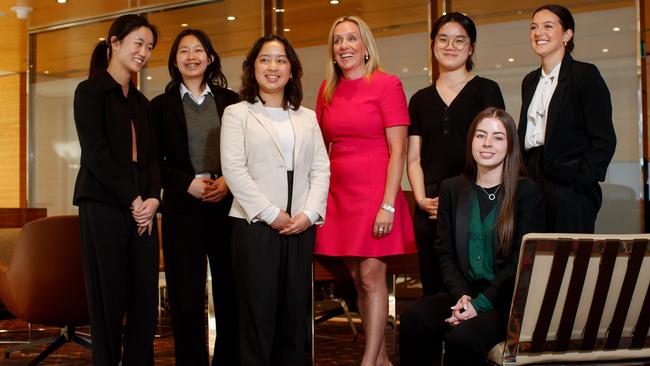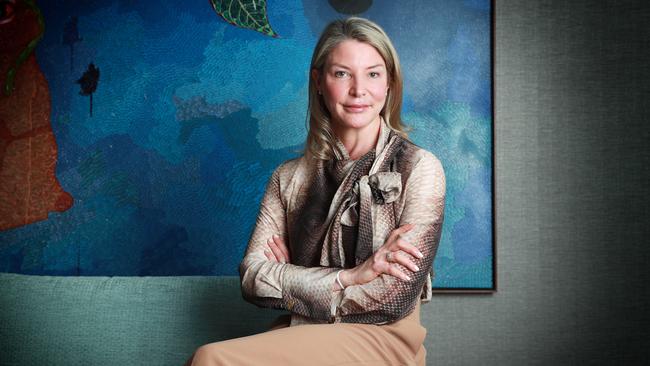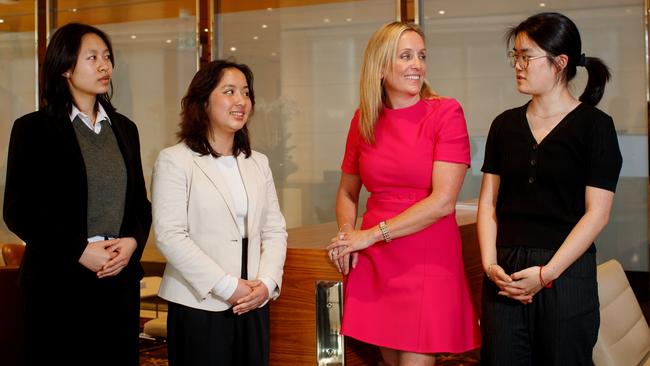Work-life balance key for next generation of younger women coming into business
The next generation of young women coming into business are more internationally savvy, and more conscious of climate change. They are also concerned about work-life balance.

The next generation of young women coming into business are more internationally savvy, and more conscious of climate change.
While educated and ambitious, they are also concerned about work-life balance.
Three senior corporate women who have given presentations this week to the UBS Young Women’s leadership program for Year 11 high school students spoke about the differences they see in the younger generation of women coming into business today.
“They are very different,” said Camilla Love, a former executive in the funds management industry who founded F3, which encourages young women to build a career in financial services.
“They want to travel at the drop of a hat,” she said. “They are much more global citizens than we ever were.
“They have an enthusiasm and passion and drive which is amazing to see. They believe they can do whatever they want and are prepared to give it a try.”
She said young women entering the corporate world were more concerned than their predecessors about climate change and working for organisations with a social purpose.
“This (new generation) see themselves as global citizens who, as part of that, are concerned about sustainability. How can they add purpose? How can they have a lighter global footprint?
“If they are in finance, it is about funding the right deals and putting capital to work (for sustainable purposes).”
Alison Telfer, Australasia head for UBS Asset Management, said young women had more of a “global mindset” than an earlier generation of women executives.
They were also more concerned about work-life balance.
“They have very pronounced expectations around (that) balance – having a life,” she said.
This contrasted with her own career, initially as a lawyer and then moving into finance, where she believed she had to work long hours away from home to succeed despite having three children.
“I knew (a work-life balance) was off the table,” she said. “It was a thrill to work until midnight and eat dinner at work.”
But she said younger women coming into the corporate world today “have got much stronger boundaries around that”.

Arlene Tansey, a former commercial and investment banker whose company directorships include Aristocrat Leisure and McMillan Shakespeare, said there were still many lessons young women needed to learn as they came into the corporate world.
“Often I see young women taking it all on their shoulders without reaching out to others for help,” she said, “whereas I see younger men reaching out for help from colleagues.
“I tell them (young women) don’t be afraid to enlist the help of others to get things done.”
The three women spoke to more than 40 Year 11 students this week as part of the UBS young women’s leadership program.
It’s the 19th year of the program, which has hosted more than 1000 students.
UBS Australia head of communications, Jenny Warat, said the students did not know much about the financial world but were “very keen to learn”.
Ms Tansey said there had been big changes in the work/life balance for women over her career.
There were now more couples opting to share the work and family load. “I know a number of senior women executives now whose husbands have opted to stay at home or work part-time, while they are taking an equal or larger share of the professional responsibilities,” she said. The three women had one universal recommendation for the young women – be prepared to “say yes” to opportunities when offered, even if they felt they were not fully prepared for them.
“When it comes to opportunities, always say yes,” said Ms Tansey. “Put your hand up and give things a try. If you find out that it’s not for you, that’s fine because it takes you down the pathway of finding out what is for you.”
She said women needed to learn to network outside of their comfort zone.
“I often go to functions with young women who are talking to women they already know,” she said. “I tell them to talk to people they don’t know.”

Ms Telfer said young women needed to learn to signal their interest in career opportunities rather than sit back and wait.
“Women, particularly young women, need to better understand the importance of signalling their ambition and capabilities,” she said. “You don’t have to boast about how great you are, but you can signal that you would like to be part of a new project or a deal or a team.”
The three urged women to look to women in other countries for inspiration as business leaders.
Ms Telfer said she was concerned that while Australia ranked highly for women’s education, it ranked much lower in the levels of female participation in the workforce.
“We’re one or two in the world for the education of women but we are way down the list – maybe around 16th or thereabouts – in terms of female participation in the workforce,” she said.
“I think the debate in Australia (for women executives) is that they have to pick one or the other (work or family). There’s a bit of a drum beat around: ‘How do you do it all?’ ”
For their part, they said women who had succeeded in business should be prepared to help the careers of young women.
“Our generation has to take responsibility through mentorship,” Ms Telfer said.
“If we don’t, they (young women) will miss a beat and they might not meet their potential.
“They have big ideas, but they still face the same issues – where is the door? How do I open it? We need to be supporting them along the way.”
Ms Love said that there were many ways senior women in business could help younger women, ranging from mentorship and sponsorship to taking opportunities to provide encouragement.
“I believe that pulling young women up the corporate ladder is important. I’ve put close to 400 girls through work experience through F3.
“I can’t mentor them all, but you can still find someone at an early stage in their career, tap them on the shoulder and tell them you believe in them. Sometimes that little piece of advice can push them along.”
She said she felt the future was bright for the next generation of young women in finance.
“We are surrounded by highly intelligent people. Every day you are getting a new piece of information going into the market which changes the dynamic.”






To join the conversation, please log in. Don't have an account? Register
Join the conversation, you are commenting as Logout